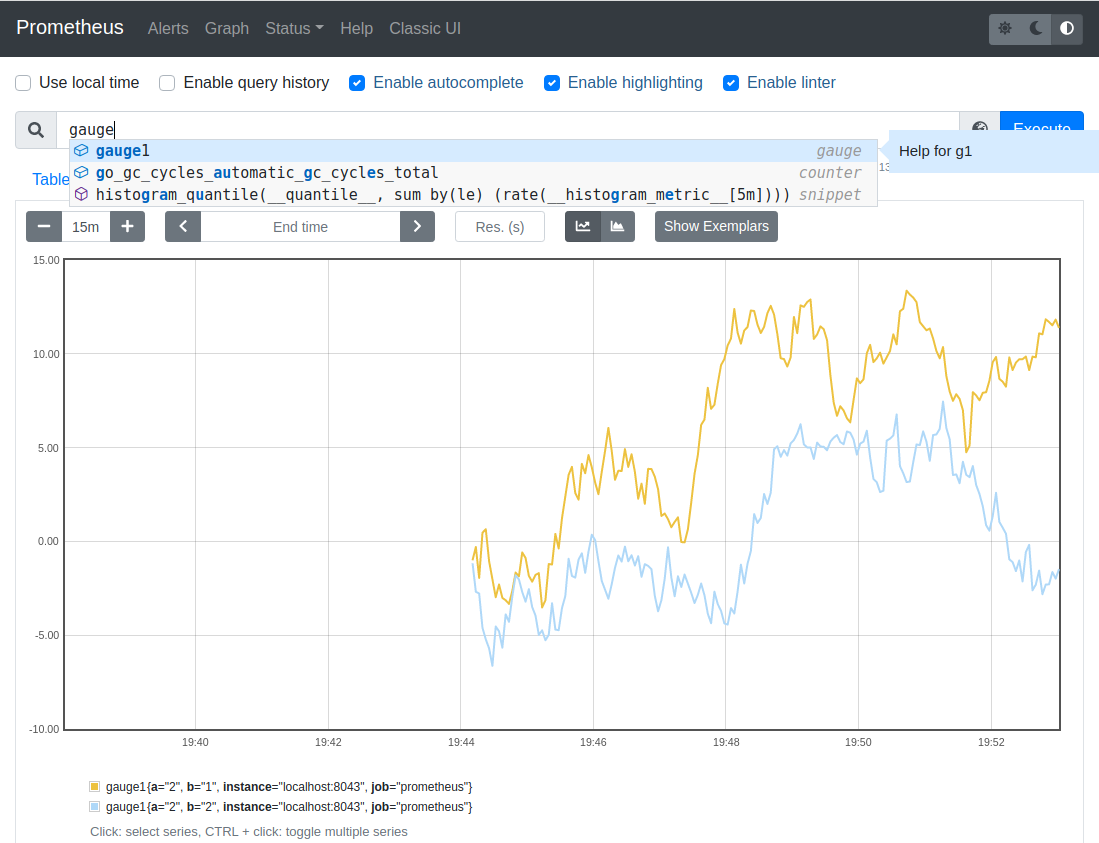Prometheus metrics server
Below is a simple server for Prometheus metrics. The code also has classes to represent Prometheus counters and gauges.
package require TclOO
# Helper for callback functions
proc oo::Helpers::mycode {args} {
list namespace inscope [uplevel 1 {namespace current}] [linsert $args 0 my]
}
# Base class for Prometheus metrics:
#
# type : type of the metric, one of: counter, gauge
# name : name of the metric, no spaces allowed
# help : help text for the metric
# labels: set of labels for the metric
oo::class create PrometheusMetric {
variable type name help labels
constructor {itype iname ihelp args} {
set type $itype
set name $iname
set help $ihelp
set labels $args
}
method format_help {} {
return "\# HELP $name $help"
}
method format_type {} {
return "\# TYPE $name $type"
}
method format_value {value} {
set result "$name"
if {[llength $labels]} {
set L {}
foreach {k v} $labels {
lappend L "$k=\"$v\""
}
append result "\{"
append result [join $L ","]
append result "\}"
}
append result " " $value
return $result
}
}
# Counter metric
oo::class create PrometheusCounter {
superclass PrometheusMetric
variable counter
constructor {iname ihelp args} {
set counter 0
next counter $iname $ihelp {*}$args
}
method inc {{v 1}} { set counter [expr {$counter + $v}] }
method metric {} {
return "[my format_help]\n[my format_type]\n[my format_value $counter]\n"
}
}
# Gauge metric
oo::class create PrometheusGauge {
superclass PrometheusMetric
variable value
constructor {iname ihelp args} {
set value 0
next gauge $iname $ihelp {*}$args
}
method inc {{v 1}} { set value [expr {$value + $v}] }
method dec {{v 1}} { set value [expr {$value - $v}] }
method set_value {v} { set value $v }
method metric {} {
return "[my format_help]\n[my format_type]\n[my format_value $value]\n"
}
}
# simple server the Prometheus scraper can use to get metrics
oo::class create PrometheusMetricsServer { # Based on dustmote
variable port metrics server
constructor {iport imetrics} {
set port $iport
set metrics $imetrics
set server [socket -server [mycode answer] $port]
}
destructor {
close $server
}
method answer {socketChannel host2 port2} {
fileevent $socketChannel readable [mycode process_request $socketChannel]
}
method process_request {socketChannel} {
fconfigure $socketChannel -blocking 0
set gotLine [gets $socketChannel]
if { [fblocked $socketChannel] } then {return}
fileevent $socketChannel readable ""
puts $gotLine
fconfigure $socketChannel -translation binary -buffering full
puts $socketChannel "HTTP/1.0 200 OK"
puts $socketChannel ""
foreach p $metrics {
puts $socketChannel [$p metric]
}
close $socketChannel
}
}The example below creates 2 counters and 2 gauges and starts a server on port 8043 Prometheus can scrape:
# Create some metrics
set P {}
lappend P [PrometheusCounter new counter1 "Help for c1" a 1 b 1]
lappend P [PrometheusCounter new counter1 "Help for c1" a 1 b 2]
lappend P [PrometheusGauge new gauge1 "Help for g1" a 2 b 1]
lappend P [PrometheusGauge new gauge1 "Help for g1" a 2 b 2]
# Create the metrics server
PrometheusMetricsServer create s1 8043 $P
# Update the metrics every second
proc update_metrics {} {
puts "Update metrics"
foreach p $::P {
switch -exact -- [info object class $p] {
::PrometheusCounter {
$p inc [expr {rand()}]
}
::PrometheusGauge {
if {[expr {rand()}] >= 0.5} {
$p inc [expr {rand()}]
} else {
$p dec [expr {rand()}]
}
}
}
}
after 1000 update_metrics
}
update_metrics
# Let the application run
proc bgerror {trouble} {puts stdout "bgerror: $trouble"}
vwait foreverLet Prometheus know the metrics server is available at port 8043 by listing it as scrape target in the prometheus.yml config file
scrape_configs:
# The job name is added as a label `job=<job_name>` to any timeseries scraped from this config.
- job_name: "prometheus"
# metrics_path defaults to '/metrics'
# scheme defaults to 'http'.
static_configs:
- targets: ["localhost:9090", "localhost:8043"]Below you can see how the 2 gauges (with different labels) look in Prometheus:
